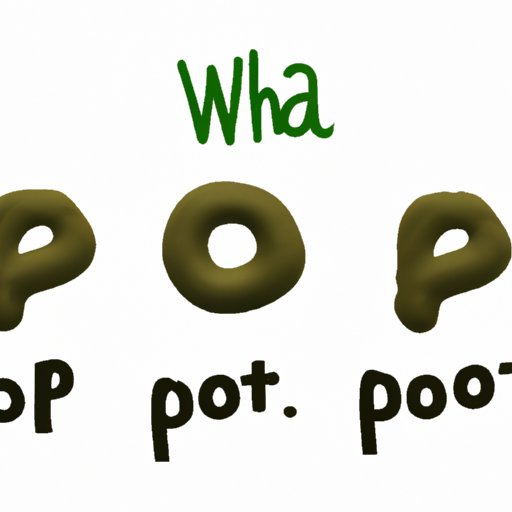Introduction
Poo. Poop. Feces. Whatever we choose to call it, it’s one of the most natural and universal aspects of our biology. But for all the ubiquity of bowel movements, we still have a long way to go when it comes to understanding and talking about them. Many of us have been trained to feel embarrassed or ashamed to discuss our poop, but the truth is, it can reveal a lot about our bodies and overall well-being.
That’s why we’ve put together this comprehensive guide to all things poo. We’ll not only cover the basics of what it is and how it’s formed, but also delve into how it can benefit our gardens and farms, why it’s important to talk more openly about it, and even how it affects our mental health. By the end of this article, we hope you’ll have a newfound appreciation for your bowel movements and the role they play in keeping you healthy.
The Ins and Outs of Poo: Your Complete Guide to Understanding Your Bowel Movements
The quality of your poop is often a reflection of what you’re eating and how well your digestive system is functioning. While we’re all used to seeing brown stools, there are actually several different consistencies and colors that can signify different things for our health.
For example, if your poop is watery or loose, you may be suffering from diarrhea, which can be caused by a variety of factors such as food poisoning, medication side effects, or an underlying digestive disorder. On the other hand, hard or lumpy feces can indicate constipation, which may be caused by a lack of fiber in your diet, dehydration, or other underlying medical conditions. If you’re seeing blood in your stool, it’s important to consult a doctor as soon as possible as it could signal a serious health issue.
To maintain a healthy digestive system, it’s important to eat a balanced diet rich in fiber, vitamins, and nutrients. Drinking plenty of water and getting regular exercise can also help keep things moving smoothly. Additionally, paying attention to the quality and consistency of your poop can help you identify potential health issues early on, preventing more serious problems down the line.
Poo 101: A Beginner’s Guide to the Science of Feces
So what exactly is poo made of? Believe it or not, only about 25% of our feces is solid matter. The rest is made up of water, bacteria, and other substances that our bodies are unable to absorb. Bacteria in particular play a crucial role in breaking down food and aiding in digestion, and are responsible for many of the distinctive smells associated with poo.
But not all bacteria are created equal. Our gut is home to a complex ecosystem of different microbes, including both good and bad bacteria. Understanding this microflora and how it affects our health is still an area of active research, but we do know that maintaining a healthy balance of microbes in our gut is vital for digestive health, immune function, and even mental health.
From the Toilet to the Garden: How Poo Can Benefit Your Plants
While it may be a less-than-pleasant topic of conversation, feces can actually be a valuable resource for gardeners and farmers. Animal and human waste can both be used as natural fertilizer, as they contain many of the nutrients and microorganisms that plants need to thrive. In many parts of the world, this practice is still common and accepted as a sustainable form of agriculture.
Using poo as fertilizer not only helps reduce waste in landfills, but also reduces the need for chemical fertilizers that can be damaging to the environment. Of course, proper handling and treatment of waste is crucial to prevent the spread of disease and contamination of food crops, but when done responsibly, it can be a valuable resource for sustainable agriculture.
Breaking the Stigma: Why We Need to Talk More About Poo
Despite its importance for our health and environmental sustainability, discussing poo remains a taboo topic in many cultures. Shame and embarrassment are often cited as reasons for keeping quiet about our bowel movements, but this can have negative consequences for our health. For example, people may delay seeking help for digestive problems out of embarrassment, allowing conditions to worsen over time.
By breaking the stigma surrounding poo and talking more openly about it, we can help reduce the embarrassment and shame that often surrounds bowel movements. This can help people be more proactive about seeking medical help when needed, and ensure that everyone has access to proper sanitation and waste management facilities.
The Psychology of Poo: What Our Bowel Movements Say About Our Mental Health
Finally, it’s worth mentioning the link between gut health and mental health. Research has shown that the gut microbiome, the complex community of microorganisms living in our digestive system, can have a significant impact on our mood, cognitive function, and overall mental well-being.
For example, a recent study found that people with depression had different gut microbial profiles compared to healthy individuals, suggesting a potential link between gut health and mental health. Other studies have shown that manipulating the gut microbiome through probiotics or other interventions can help alleviate symptoms of anxiety and depression.
Conclusion
Poo may not be the most glamorous or appealing topic, but it’s a crucial aspect of our health and well-being. By understanding the science behind our bowel movements, using feces as a resource for gardening and farming, and breaking the stigma surrounding poo, we can take better care of ourselves and our planet. So let’s talk openly and honestly about our poop, and embrace all the fascinating and important insights it has to offer.
